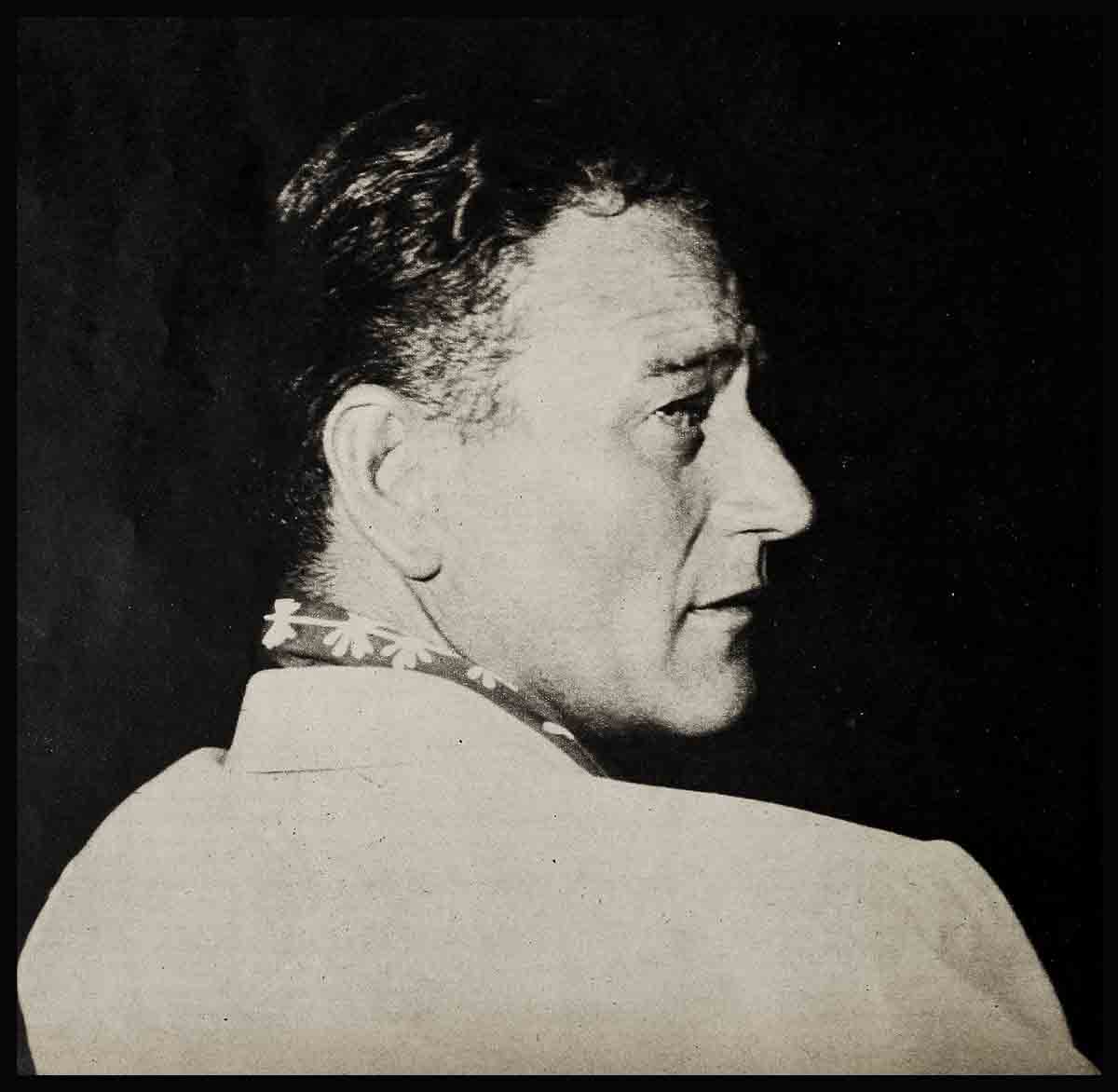
The On Again, Off Again John Waynes
Several weeks ago when he finished Big Jim McLain, his latest, in Honolulu, John Wayne grabbed the first plane and winged back to Hollywood.
He was nervous and anxious throughout the entire flight. He was worrying about Chata, his beautiful Mexican wife with whom he’s had a very disturbing touch-and-go relationship these past six months.
Chata had been with Duke in Honolulu, purportedly on a second honeymoon, but when he’d started the picture, Chata had packed her bags—she’s no location wife—and back she’d come to their rambling estate in the San Fernando Valley.
Was Chata—the word is Spanish for pug-nose—angry with him? Was she happy? Had her skin allergy broken out again? How was she doing with her mother?
These and many other questions raced through Duke’s mind as the Stratocruiser put down at the Los Angeles International Airport. It was 7:00 a.m., and Duke’s old friend, Al Murphy, was waiting with a car.
Duke gave Al a lusty greeting, then climbed into the Buick and headed for home and Chata. Only Chata wasn’t there, and a look of hurt disappointment broke over Duke’s face. He dropped into an easy chair and muttered a few words to himself, then rose, tramped around the house, asking the help if they knew what the score was.
It doesn’t take long for news to make the rounds in Hollywood. Inside of a few hours, the gossip-gals were phoning Wayne.
“Is it true,” one asked, “that Mrs. Wayne has flown the coop?”
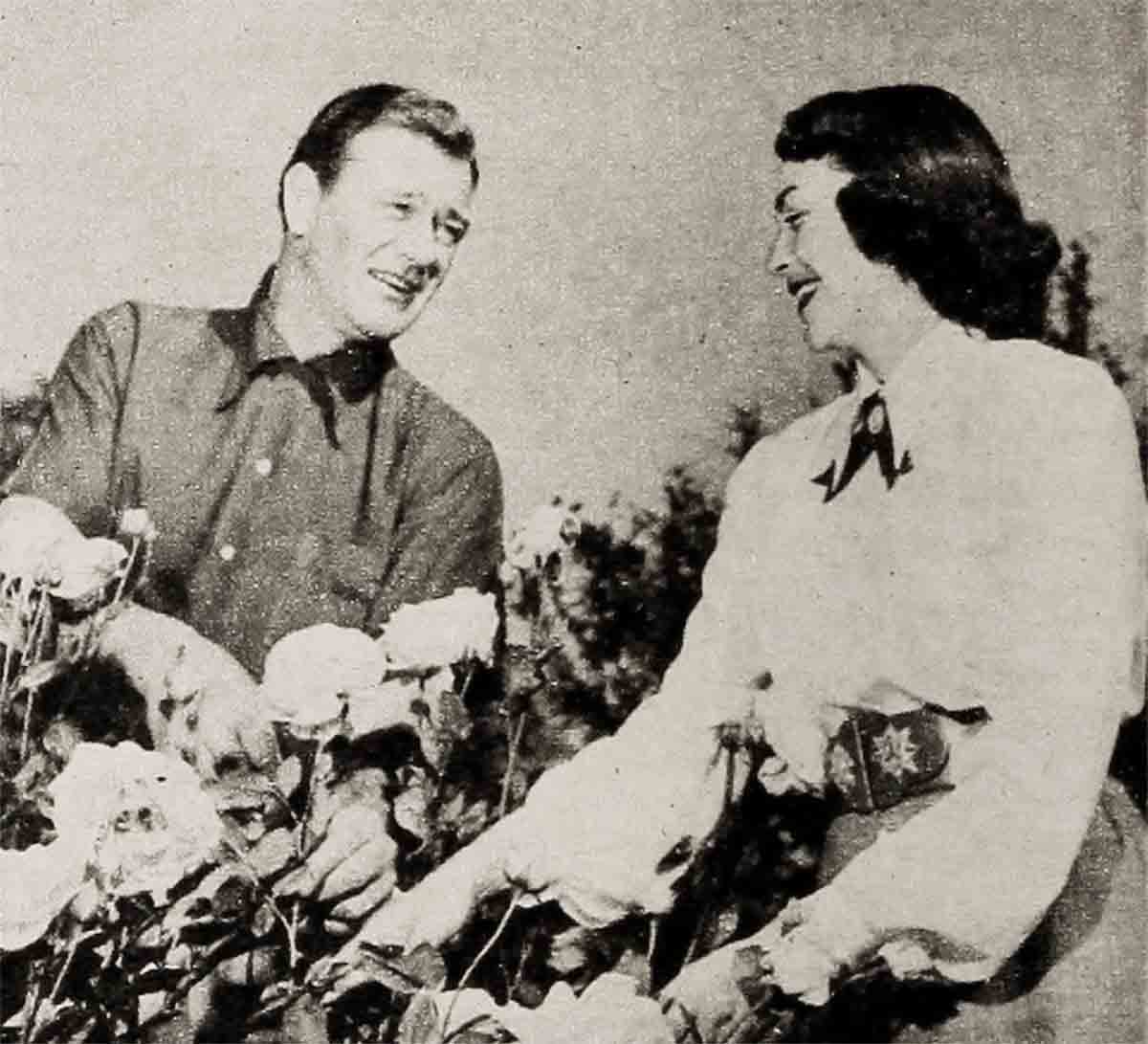
“Look,” Duke said, “all I know is that she’s gone to Mexico City with her mother for ten days. She’ll be back then. Everything’s fine.”
That’s a stock answer with Duke. He refuses to lead his private life in public, and whenever anyone asks how his marriage is coming along, there’s the usual one-word answer, “Fine.”
Only it doesn’t happen to be true. Duke’s marriage has been foundering for years, suffering from a variance in temperament, outlook, mother-in-law trouble, background, and a few other difficulties.
To understand the story behind the recurrent separation rumors, it is essential to know something about the beautiful young actress Duke married in 1946 at the Long Beach Presbyterian Church.
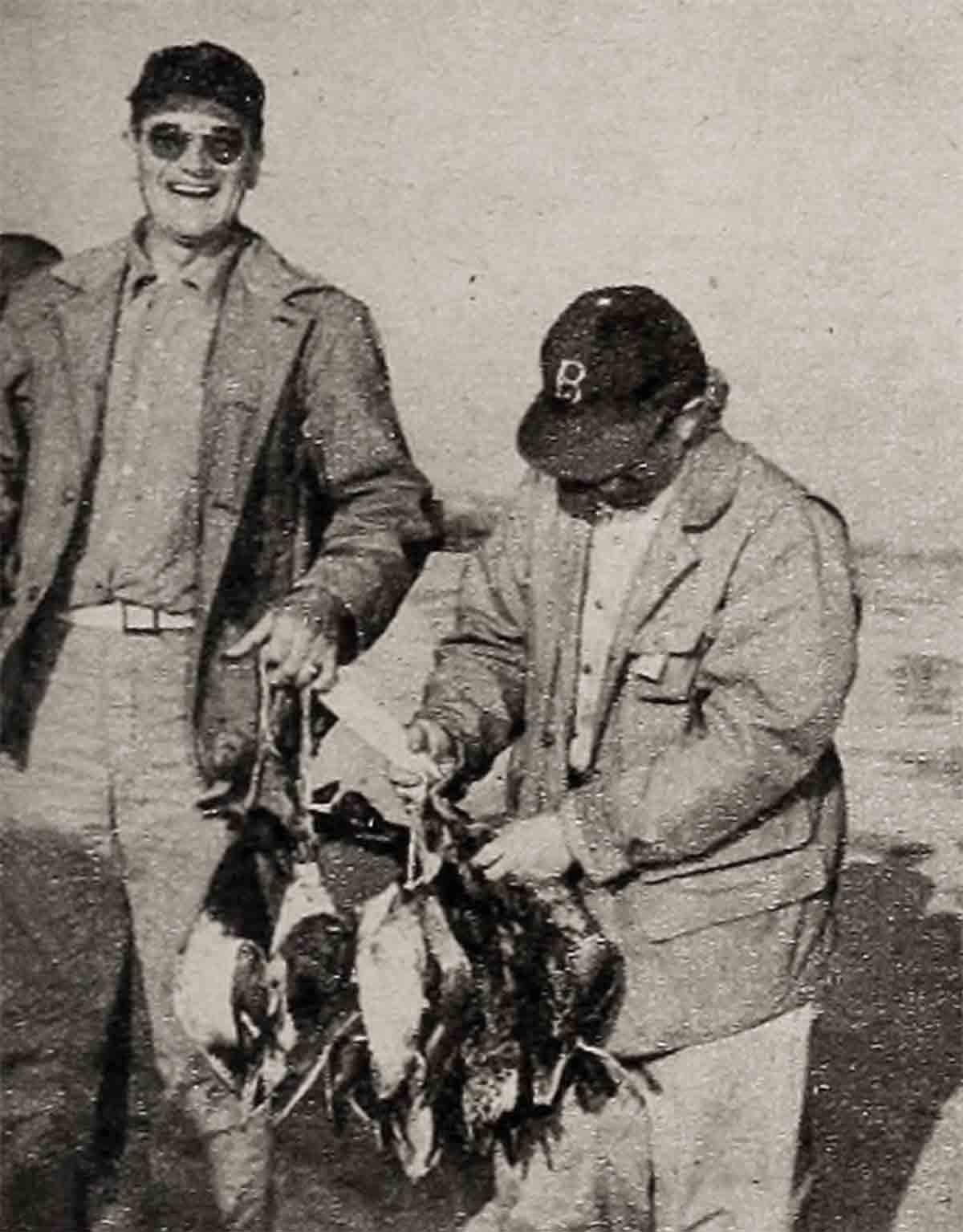
To begin with, she was 15 years his junior and an only child. They had met in Mexico City and Duke had taken her boating on the floating gardens of Xochimilco, where natives in flat-bottom boats pull up beside you and for a few pesos sell you soft drinks, great fragrant bouquets of flowers, and all matter of souveniers.
It was the 17th of the month so Duke bought his Chata 17 red roses, and on each wedding anniversary she receives the same gift.
Chata (Esperanza Bauer) was a competent actress in Mexico. and on the way up when Duke Wayne first met and fell in love with her. She had none of the fame that enveloped Maria Felix and Dolores Del Rio nor the touted sex appeal of a young internationalist named Blanca Welter Christian who was later to become Mrs. Tyrone Power.
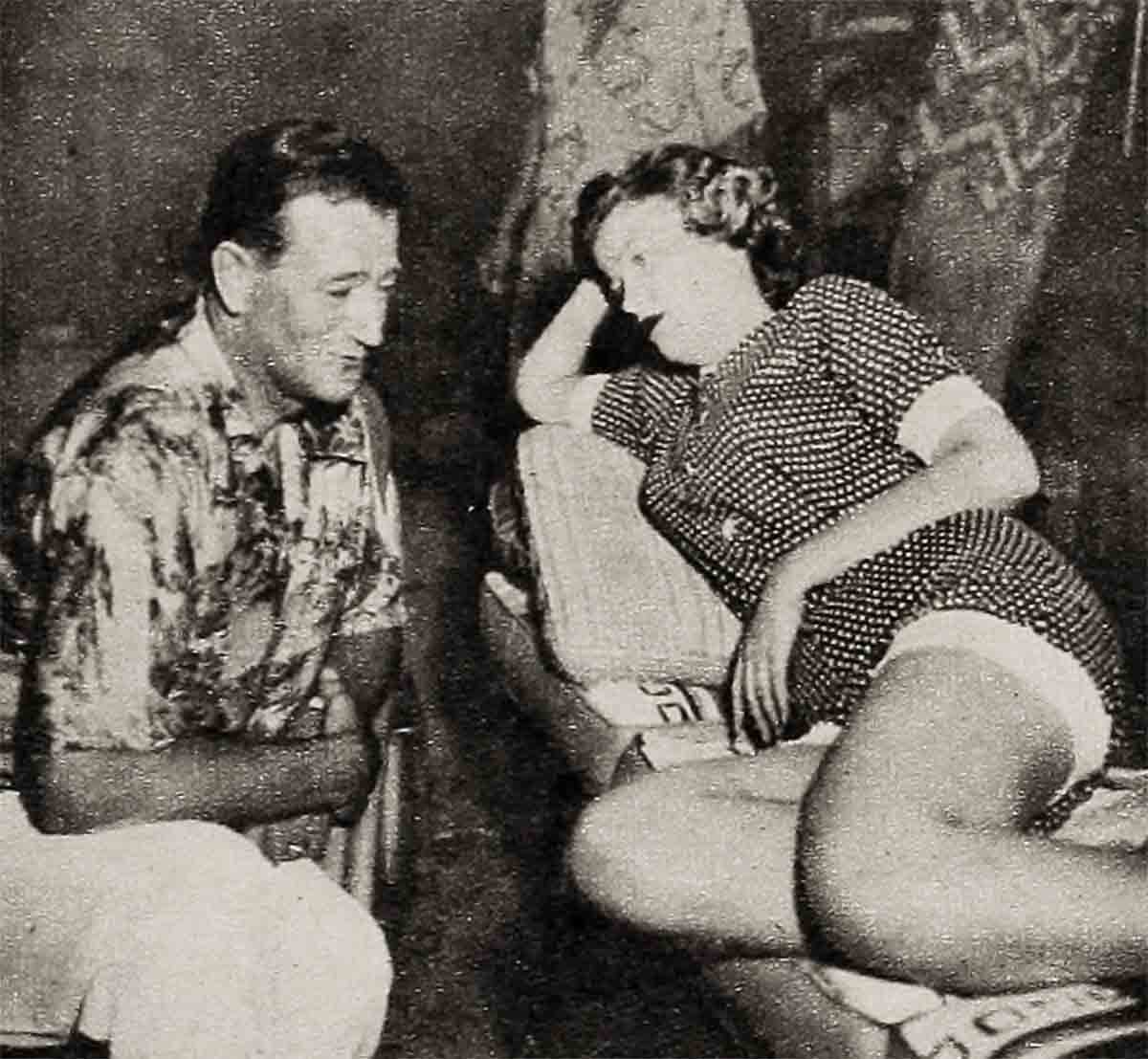
Esperanza lived a quiet life with her mother, who was only 15 years older than she; because of the nearness of their ages, the relationship was almost sisterly.
Added to this was the fact that Mrs. Bauer had been separated from her husband ever since her daughter’s infancy. She had no other children. Esperanza was and is the all-consuming interest of her life.
In Catholic countries, maternal supervision is extremely strict. In Esperanza’s case, it was nearly slavish, since Senora Bauer had nothing else to do but watch over her daughter and her career.
This sort of solicitous care is admirable, but it has its drawbacks, too, and one of the most outstanding is that it hinders the growth of self-reliance on the part of the girl who is being supervised.
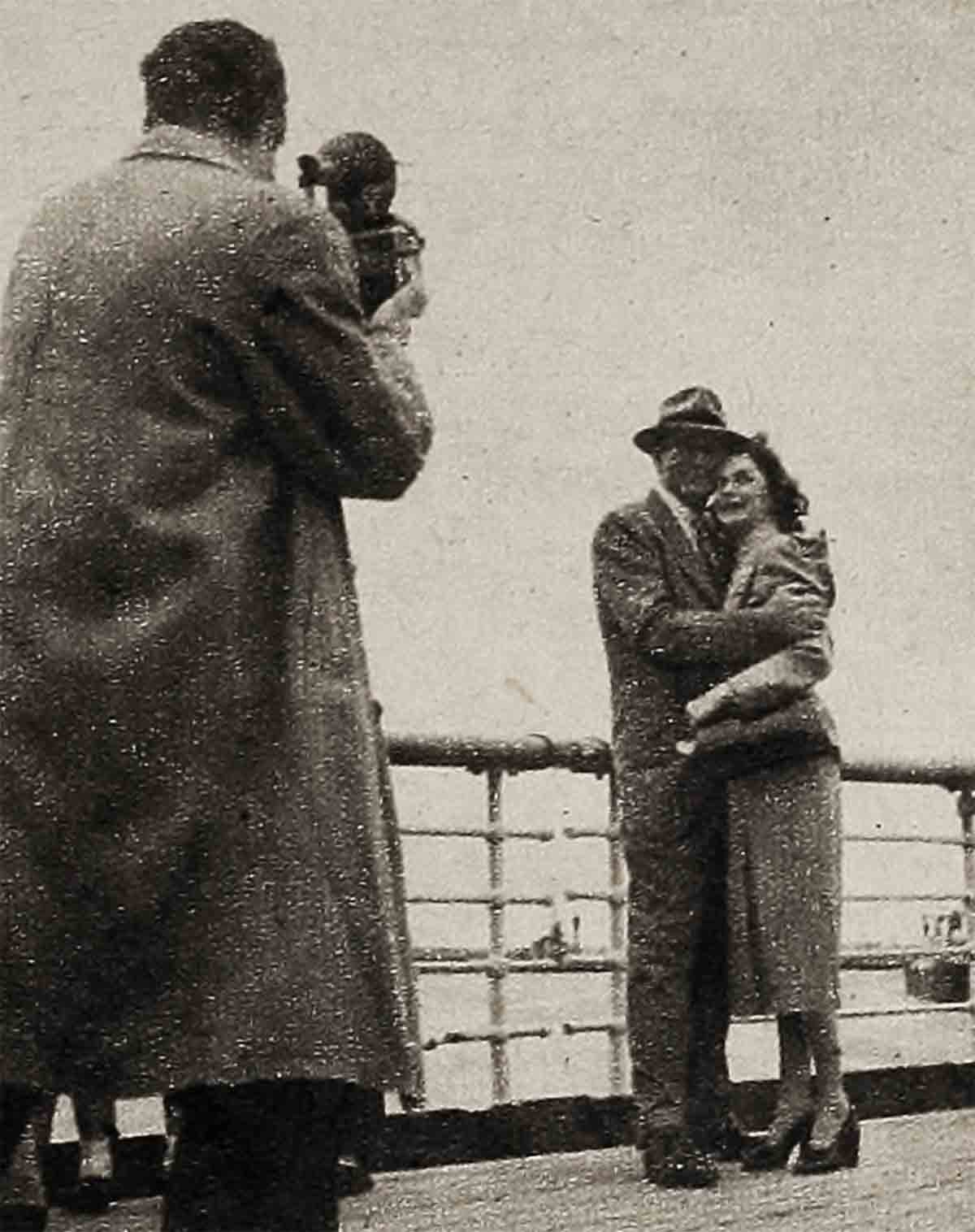
It is no secret that when Chata married Duke Wayne, she felt lost; so, too, did her mother. Duke, having much more perspicacity than people give him credit for, much more sensitivity and insight, recognized this at once, and it was he who insisted that his mother-in-law live with them.
He hadn’t thought about it beforehand—in fact, had only bought a small house with one bedroom and a den. But when he saw how deeply this separation through marriage affected mother and daughter, he said, “You must live with us, Mamacita. It’ll be best for everyone.”
Mrs. Bauer refused. “It is best for young married people to live alone,” she advised. But then she looked at Chata, at the desperate plea for acquiescence in her daughter’s eyes, and at last, she let herself be won over. She went to live with Duke and Chata, no doubt hoping to make a break in the near future. But the break never came.
It is difficult to grow up and face your problems yourself when you have a mother nearby to do all this for you, and that’s what happened to Chata, according to intimates.
When Duke was away, and he’s away a good deal of the time on location, Chata always had her mother for companionship. They gossiped together, they went shopping, they gradually re-furnished the house.
When Chata came down with a cold, Mrs. Bauer took charge at once. Nothing was too good for her baby.
When Chata had small quarrels with her husband—and these are part and parcel of every marriage—there was always Mamacita to run to. While Duke never complained, he’s always been partial to people who stand on their own two feet.
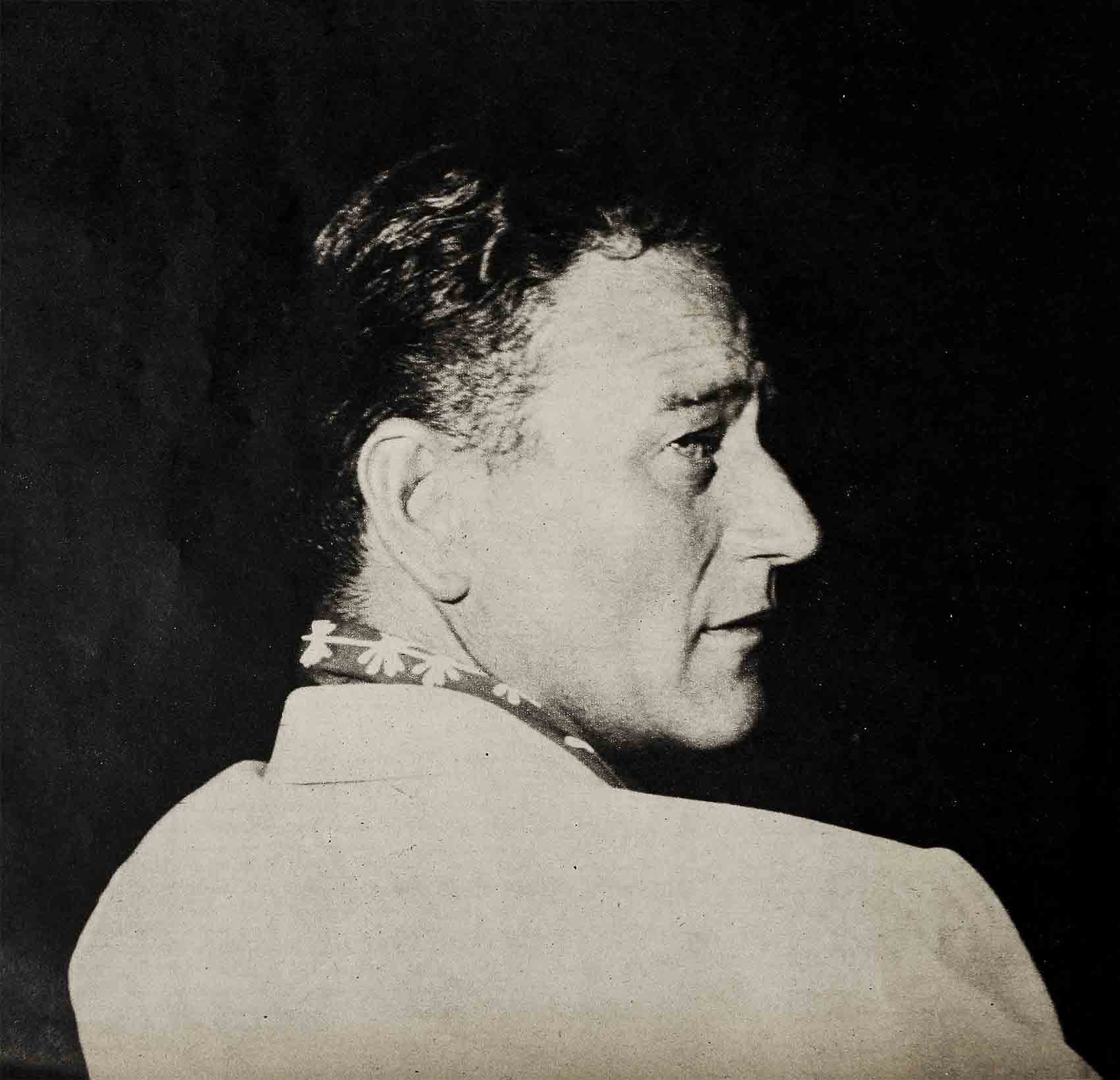
Friends say that he resented the fact that, on occasion, Chata would move inte a hospital and take a room next to her mother when Mrs. Bauer was ill. Whether or not he thought this was carrying loyalty too far, Duke never said. Where Chata is concerned, he’s been amazingly tractable. He has loved his little “Pugnose” very much and realizes that she gave up much for him.
“Sometimes a man’s second wife resembles his first. This is true where Wayne is concerned in that both of his wives are of Latin extraction.
Duke’s first wife, Josephine Saenz, was the daughter of the Dominican consul stationed in Los Angeles. She met Duke when she was a coed at the University of Southern California, and he was a second-string tackle on the football team. They were married in 1933 in a Catholic ceremony held in Loretta Young’s garden. Ten years and four children later, Duke was hailed into court and sued for divorce on grounds of mental cruelty.
The mental cruelty was the legal facade. Josephine was socially ambitious, intent upon raising her children and meeting people in the right circles, a woman of great charity and civil consciousness—and Duke—well, he’s always been the earthy, homespun type who prefers to hoist a few, with loud and lusty men such as Grant Withers, Ward Bond, Jack Ford, and others of that ilk. Basically, he’s a man’s man.
When he married Chata he not only found her physical beauty irresistible but was overcome by her spiritual tranquillity and her willingness to dedicate her entire life to him. This oneness of purpose was something he found almost difficult to believe—a woman who wanted absolutely nothing but him.
But a man sometimes is not enough. There should be children or friends. The Waynes’ marriage has not been blessed. with children; and Duke has spent so much of his time working far from home that there has been no one for Chata but Mamacita. Since Mamacita’s ties are to the old country, there have been many, Many trips to Mexico City and Acapulco. For a time Chata was sure that she had lost Duke to his work, and while she realized that a man’s work came above his woman, she resented not having her share of his time.
Chata is not one for the rough, lusty, back-slapping frontier type of humor. No Latin-American girl is. In the company of Duke’s friends, she has frequently felt out of place, insecure, an intruder in her own home, because discussions of fishing and polities left her cold.
This insecurity, this loneliness, this feeling of being outside the pale manifested itself in various psychosomatic illnesses.
Bo Roos, Duke’s business manager, who goes down to the Scripps Clinic at La Jolla for a checkup each year, suggested that Chata check in and let the doctors give her a thorough going over.
“If anyone can find out about Ker skin allergy,” Roos said, “these guys at the Clinic are the ones.”
So Chata came and was examined, and when it was all over, the doctors shrugged and said, “Nothing organically wrong, Mr. Wayne. It’s probably just nerves.” But this manifestation of nervousness had something behind it and still does.
A friend of Wayne’s feels that “Chata thinks her husband resents her mother. But Duke really likes Mrs. Bauer a lot.
Others suggest that Chata is afraid of facing life, of making her own decisions without maternal advice. They say that there is a tremendous conflict seething within her. To whom does she owe her first loyalty? To the mother who has sacrificed everything for her? Or to her husband?
When Duke was pressed for some reason why he’d. returned to a wifeless home after finishing Big Jim McLain, he said, “Chata’s gone down to Mexico City to buy her mother a house. After that, she’s coming back here. We haven’t separated or broken up or any of that stuff.”
That Chata is willing to work hard to save her marriage, no one denies. When reporters asked her in Mexico City whether she was determined to divorce Wayne or would try to work things out, she said emphatically, “I still hope that John and I can work everything out and that we’ll be back together very shortly. Of course, I can’t promise definitely that we will. Nobody can, but we’ll try. I always think when there’s been trouble that it’s a good idea to get away from Hollywood for a while and let things simmer down.”
Jerry Giesler, the famous trial lawyer whom Chata had consulted last February before she and Duke were reconciled, told me, “By the time your article appears in in print, we’ll definitely know whether the marriage is on again or off again.”
THE END
—BY MARSHA SAUNDERS
It is a quote. MODERN SCREEN MAGAZINE SEPTEMBER 1952




